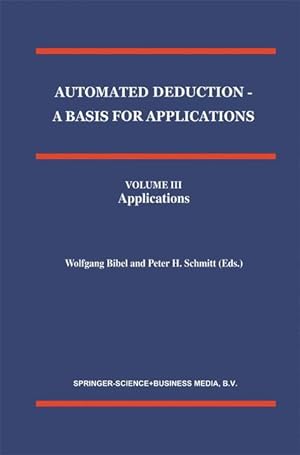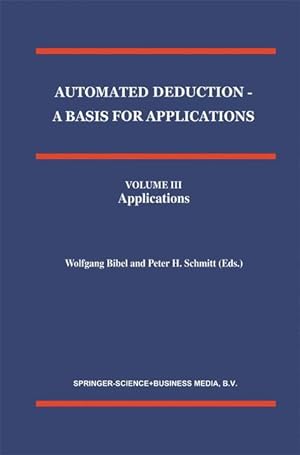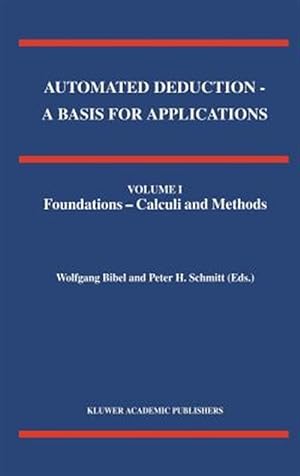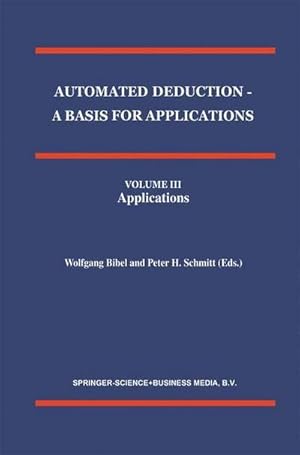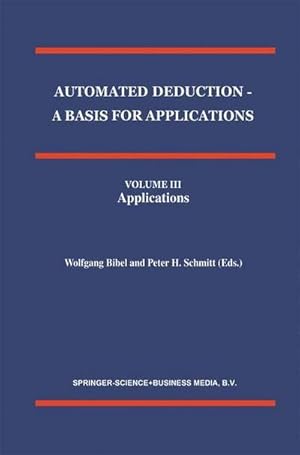automated deduction basis applications (81 risultati)
Filtri di ricerca
Tipo di articolo
- Tutti i tipi di prodotto
- Libri (81)
- Riviste e Giornali (Nessun altro risultato corrispondente a questo perfezionamento)
- Fumetti (Nessun altro risultato corrispondente a questo perfezionamento)
- Spartiti (Nessun altro risultato corrispondente a questo perfezionamento)
- Arte, Stampe e Poster (Nessun altro risultato corrispondente a questo perfezionamento)
- Fotografie (Nessun altro risultato corrispondente a questo perfezionamento)
- Mappe (Nessun altro risultato corrispondente a questo perfezionamento)
- Manoscritti e Collezionismo cartaceo (Nessun altro risultato corrispondente a questo perfezionamento)
Condizioni Maggiori informazioni
- Nuovo (72)
- Come nuovo, Ottimo o Quasi ottimo (8)
- Molto buono o Buono (1)
- Discreto o Mediocre (Nessun altro risultato corrispondente a questo perfezionamento)
- Come descritto (Nessun altro risultato corrispondente a questo perfezionamento)
Legatura
Ulteriori caratteristiche
- Prima ed. (6)
- Copia autograf. (Nessun altro risultato corrispondente a questo perfezionamento)
- Sovracoperta (Nessun altro risultato corrispondente a questo perfezionamento)
- Con foto (28)
- Non Print on Demand (54)
Lingua (1)
Spedizione gratuita
Paese del venditore
Valutazione venditore
-
Automated Deduction - A Basis for Applications, Volume III Applications.
Editore: Kluwer Academic Publishers, 1998
ISBN 10: 0792351312 ISBN 13: 9780792351313
Lingua: Inglese
Da: Antiquariat Bernhardt, Kassel, Germania
EUR 42,30
Convertire valutaEUR 35,95 per la spedizione da Germania a U.S.A.Quantità: 1 disponibili
Aggiungi al carrellogebundene Ausgabe. Condizione: Sehr gut. Hier nur Volume III. Zust: Gutes Exemplar. Mit Vorbesitzereintrag. XII, 334 Seiten, Englisch 670g.
-
Automated Deduction - A Basis for Applications, Volume II Systems and Implementation Techniques.
Editore: Kluwer Academic Publishers, 1998
ISBN 10: 0792351304 ISBN 13: 9780792351306
Lingua: Inglese
Da: Antiquariat Bernhardt, Kassel, Germania
EUR 50,00
Convertire valutaEUR 35,95 per la spedizione da Germania a U.S.A.Quantità: 1 disponibili
Aggiungi al carrellogebundene Ausgabe. Condizione: Gut. Hier nur Volume II. Zust: Gutes Exemplar. Mit Vorbesitzereintrag. Ehemaliges Bibliotheksexemplar, mit Schildchen auf dem Buchrücken, mit Stempel auf dem Buchschnitt. Buchrücken leicht bestoßen. XIV, 434 Seiten, Englisch 856g.
-
Automated Deduction - A Basis for Applications, Volume I Foundations - Calculi and Methods.
Editore: Kluwer Academic Publishers, 1998
ISBN 10: 0792351290 ISBN 13: 9780792351290
Lingua: Inglese
Da: Antiquariat Bernhardt, Kassel, Germania
EUR 60,00
Convertire valutaEUR 35,95 per la spedizione da Germania a U.S.A.Quantità: 1 disponibili
Aggiungi al carrellogebundene Ausgabe. Condizione: Sehr gut. Hier nur Volume I. Zust: Gutes Exemplar. Mit Vorbesitzereintrag. XX, 480 Seiten, Englisch 940g.
-
Automated Deduction - A Basis for Applications Volume I Foundations - Calculi and Methods Volume II Systems and Implementation Techniques Volume III Applications (Paperback)
Da: Grand Eagle Retail, Bensenville, IL, U.S.A.
Prima edizione
EUR 157,03
Convertire valutaGratis per la spedizione in U.S.A.Quantità: 1 disponibili
Aggiungi al carrelloPaperback. Condizione: new. Paperback. The nationwide research project 'Deduktion', funded by the 'Deutsche Forschungsgemeinschaft (DFG)' for a period of six years, brought together almost all research groups within Germany engaged in the field of automated reasoning. Intensive cooperation and exchange of ideas led to considerable progress both in the theoretical foundations and in the application of deductive knowledge. This three-volume book covers these original contributions moulded into the state of the art of automated deduction. The three volumes are intended to document and advance a development in the field of automated deduction that can now be observed all over the world. Rather than restricting the interest to purely academic research, the focus now is on the investigation of problems derived from realistic applications. In fact industrial applications are already pursued on a trial basis.In consequence the emphasis of the volumes is not on the presentation of the theoretical foundations of logical deduction as such, as in a handbook; rather the books present the concepts and methods now available in automated deduction in a form which can be easily accessed by scientists working in applications outside of the field of deduction. This reflects the strong conviction that automated deduction is on the verge of being fully included in the evolution of technology. Volume I focuses on basic research in deduction and on the knowledge on which modern deductive systems are based. Volume II presents techniques of implementation and details about system building. Volume III deals with applications of deductive techniques mainly, but not exclusively, to mathematics and the verification of software. Each chapter was read by two referees, one an international expert from abroad and the other a knowledgeable participant in the national project. It has been accepted for inclusion on the basis of these review reports.Audience: Researchers and developers in software engineering, formal methods, certification, verification, validation, specification of complex systems and software, expert systems, natural language processing. We are invited to deal with mathematical activity in a sys tematic way [ . The field of automated deduction has witnessed considerable progress and in the last decade, automated deduction methods have made their way into many areas of research and product development in computer science. Shipping may be from multiple locations in the US or from the UK, depending on stock availability.
-
Automated Deduction - A Basis for Applications Volume I Foundations - Calculi and Methods Volume II Systems and Implementation Techniques Volume III Applications (Applied Logic Series)
Da: Lucky's Textbooks, Dallas, TX, U.S.A.
EUR 157,72
Convertire valutaEUR 3,42 per la spedizione in U.S.A.Quantità: Più di 20 disponibili
Aggiungi al carrelloCondizione: New.
-
Automated Deduction - A Basis for Applications Volume I Foundations - Calculi and Methods Volume II Systems and Implementation Techniques Volume III Applications (Hardcover)
Editore: Kluwer Academic Publishers, Dordrecht, 1998
ISBN 10: 0792351312 ISBN 13: 9780792351313
Lingua: Inglese
Da: Grand Eagle Retail, Bensenville, IL, U.S.A.
EUR 161,64
Convertire valutaGratis per la spedizione in U.S.A.Quantità: 1 disponibili
Aggiungi al carrelloHardcover. Condizione: new. Hardcover. The nationwide research project "Deduktion", funded by the "Deutsche Forschungsgemeinschaft (DFG)" for a period of six years, brought together almost all research groups within Germany engaged in the field of automated reasoning. Intensive co-operation and exchange of ideas led to considerable progress both in the theoretical foundations and in the application of deductive knowledge. This book covers these original contributions moulded into the state of the art of automated deduction. The three volumes are intended to document and advance a development in the field of automated deduction that can now be observed all over the world. Rather than restricting the interest to purely academic research, the focus now is on the investigation of problems derived from realistic applications. In fact industrial applications are already pursued on a trial basis.In consequence the emphasis of the volumes is not on the presentation of the theoretical foundations of logical deduction as such, as in a handbook; rather the books present the concepts and methods now available in automated deduction in a form which can be easily accessed by scientists working in applications outside of the field of deduction. This reflects the strong conviction that automated deduction is on the verge of being fully included in the evolution of technology. Volume I focuses on basic research in deduction and on the knowledge on which modern deductive systems are based. Volume II presents techniques of implementation and details about system building. Volume III deals with applications of deductive techniques mainly, but not exclusively, to mathematics and the verification of software. Each chapter was read by two referees, one an international expert from abroad and the other a knowledgeable participant in the national project. It has been accepted for inclusion on the basis of these review reports.The text should be of interest to researchers and developers in software engineering, formal methods, certification, verification, validation, specification of complex systems and software, expert systems and natural language processing. We are invited to deal with mathematical activity in a sys tematic way [ . The field of automated deduction has witnessed considerable progress and in the last decade, automated deduction methods have made their way into many areas of research and product development in computer science. Shipping may be from multiple locations in the US or from the UK, depending on stock availability.
-
Automated Deduction: A Basis for Applications, Vol. 3: Applications (Applied Logic Series)
Da: Lucky's Textbooks, Dallas, TX, U.S.A.
EUR 158,12
Convertire valutaEUR 3,42 per la spedizione in U.S.A.Quantità: Più di 20 disponibili
Aggiungi al carrelloCondizione: New.
-
Automated Deduction - A Basis for Applications Volume I Foundations - Calculi and Methods Volume II Systems and Implementation Techniques Volume III Applications (Applied Logic Series)
Da: Ria Christie Collections, Uxbridge, Regno Unito
EUR 159,10
Convertire valutaEUR 13,80 per la spedizione da Regno Unito a U.S.A.Quantità: Più di 20 disponibili
Aggiungi al carrelloCondizione: New. In.
-
Automated Deduction: A Basis for Applications, Vol. 3: Applications (Applied Logic Series)
Da: Ria Christie Collections, Uxbridge, Regno Unito
EUR 159,10
Convertire valutaEUR 13,80 per la spedizione da Regno Unito a U.S.A.Quantità: Più di 20 disponibili
Aggiungi al carrelloCondizione: New. In.
-
Automated Deduction - A Basis for Applications Volume I Foundations - Calculi and Methods Volume II Systems and Implementation Techniques Volume III Applications
Da: moluna, Greven, Germania
EUR 136,16
Convertire valutaEUR 48,99 per la spedizione da Germania a U.S.A.Quantità: Più di 20 disponibili
Aggiungi al carrelloCondizione: New.
-
Automated Deduction - A Basis for Applications Volume I Foundations - Calculi and Methods Volume II Systems and Implementation Techniques Volume III Applications
Da: moluna, Greven, Germania
EUR 136,16
Convertire valutaEUR 48,99 per la spedizione da Germania a U.S.A.Quantità: Più di 20 disponibili
Aggiungi al carrelloGebunden. Condizione: New.
-
Automated Deduction - A Basis for Applications Volume I Foundations - Calculi and Methods Volume II Systems and Implementation Techniques Volume III Applications (Applied Logic Series)
Da: California Books, Miami, FL, U.S.A.
EUR 194,37
Convertire valutaGratis per la spedizione in U.S.A.Quantità: Più di 20 disponibili
Aggiungi al carrelloCondizione: New.
-
Automated Deduction - A Basis for Applications Volume I Foundations - Calculi and Methods Volume II Systems and Implementation Techniques Volume III Applications (Paperback)
Da: Grand Eagle Retail, Bensenville, IL, U.S.A.
Prima edizione
EUR 207,26
Convertire valutaGratis per la spedizione in U.S.A.Quantità: 1 disponibili
Aggiungi al carrelloPaperback. Condizione: new. Paperback. The nationwide research project 'Deduktion', funded by the 'Deutsche Forschungsgemeinschaft (DFG)' for a period of six years, brought together almost all research groups within Germany engaged in the field of automated reasoning. Intensive cooperation and exchange of ideas led to considerable progress both in the theoretical foundations and in the application of deductive knowledge. This three-volume book covers these original contributions moulded into the state of the art of automated deduction. The three volumes are intended to document and advance a development in the field of automated deduction that can now be observed all over the world. Rather than restricting the interest to purely academic research, the focus now is on the investigation of problems derived from realistic applications. In fact industrial applications are already pursued on a trial basis.In consequence the emphasis of the volumes is not on the presentation of the theoretical foundations of logical deduction as such, as in a handbook; rather the books present the concepts and methods now available in automated deduction in a form which can be easily accessed by scientists working in applications outside of the field of deduction. This reflects the strong conviction that automated deduction is on the verge of being fully included in the evolution of technology. Volume I focuses on basic research in deduction and on the knowledge on which modern deductive systems are based. Volume II presents techniques of implementation and details about system building. Volume III deals with applications of deductive techniques mainly, but not exclusively, to mathematics and the verification of software. Each chapter was read by two referees, one an international expert from abroad and the other a knowledgeable participant in the national project. It has been accepted for inclusion on the basis of these review reports.Audience: Researchers and developers in software engineering, formal methods, certification, verification, validation, specification of complex systems and software, expert systems, natural language processing. rather the books present the concepts and methods now available in automated deduction in a form which can be easily accessed by scientists working in applications outside of the field of deduction. Shipping may be from multiple locations in the US or from the UK, depending on stock availability.
-
Automated Deduction - A Basis for Applications Volume I Foundations - Calculi and Methods Volume II Systems and Implementation Techniques Volume III Applications (Paperback)
Da: Grand Eagle Retail, Bensenville, IL, U.S.A.
Prima edizione
EUR 207,27
Convertire valutaGratis per la spedizione in U.S.A.Quantità: 1 disponibili
Aggiungi al carrelloPaperback. Condizione: new. Paperback. The nationwide research project 'Deduktion', funded by the 'Deutsche Forschungsgemeinschaft (DFG)' for a period of six years, brought together almost all research groups within Germany engaged in the field of automated reasoning. Intensive cooperation and exchange of ideas led to considerable progress both in the theoretical foundations and in the application of deductive knowledge. This three-volume book covers these original contributions moulded into the state of the art of automated deduction. The three volumes are intended to document and advance a development in the field of automated deduction that can now be observed all over the world. Rather than restricting the interest to purely academic research, the focus now is on the investigation of problems derived from realistic applications. In fact industrial applications are already pursued on a trial basis.In consequence the emphasis of the volumes is not on the presentation of the theoretical foundations of logical deduction as such, as in a handbook; rather the books present the concepts and methods now available in automated deduction in a form which can be easily accessed by scientists working in applications outside of the field of deduction. This reflects the strong conviction that automated deduction is on the verge of being fully included in the evolution of technology. Volume I focuses on basic research in deduction and on the knowledge on which modern deductive systems are based. Volume II presents techniques of implementation and details about system building. Volume III deals with applications of deductive techniques mainly, but not exclusively, to mathematics and the verification of software. Each chapter was read by two referees, one an international expert from abroad and the other a knowledgeable participant in the national project. It has been accepted for inclusion on the basis of these review reports.Audience: Researchers and developers in software engineering, formal methods, certification, verification, validation, specification of complex systems and software, expert systems, natural language processing. BASIC CONCEPTS OF INTERACTIVE THEOREM PROVING Interactive Theorem Proving ultimately aims at the construction of powerful reasoning tools that let us (computer scientists) prove things we cannot prove without the tools, and the tools cannot prove without us. Shipping may be from multiple locations in the US or from the UK, depending on stock availability.
-
Automated Deduction - A Basis for Applications Volume I Foundations - Calculi and Methods Volume II Systems and Implementation Techniques Volume III Applications (Applied Logic Series)
Da: Lucky's Textbooks, Dallas, TX, U.S.A.
EUR 203,82
Convertire valutaEUR 3,42 per la spedizione in U.S.A.Quantità: Più di 20 disponibili
Aggiungi al carrelloCondizione: New.
-
Automated Deduction - A Basis for Applications Volume I Foundations - Calculi and Methods Volume II Systems and Implementation Techniques Volume III Applications (Applied Logic Series, 8)
Da: Lucky's Textbooks, Dallas, TX, U.S.A.
EUR 203,82
Convertire valutaEUR 3,42 per la spedizione in U.S.A.Quantità: Più di 20 disponibili
Aggiungi al carrelloCondizione: New.
-
Automated Deduction - a Basis for Applications Volume I Foundations - Calculi and Methods Volume II Systems and Implementation Techniques Volume III Applications
Da: GreatBookPrices, Columbia, MD, U.S.A.
EUR 205,17
Convertire valutaEUR 2,26 per la spedizione in U.S.A.Quantità: Più di 20 disponibili
Aggiungi al carrelloCondizione: New.
-
Automated Deduction - A Basis for Applications Volume I Foundations - Calculi and Methods Volume II Systems and Implementation Techniques Volume III Applications (Hardcover)
Editore: Kluwer Academic Publishers, Dordrecht, 1998
ISBN 10: 0792351290 ISBN 13: 9780792351290
Lingua: Inglese
Da: Grand Eagle Retail, Bensenville, IL, U.S.A.
EUR 207,51
Convertire valutaGratis per la spedizione in U.S.A.Quantità: 1 disponibili
Aggiungi al carrelloHardcover. Condizione: new. Hardcover. The nationwide research project "Deduktion", funded by the "Deutsche Forschungsgemeinschaft (DFG)" for a period of six years, brought together almost all research groups within Germany engaged in the field of automated reasoning. Intensive co-operation and exchange of ideas led to considerable progress both in the theoretical foundations and in the application of deductive knowledge. This book covers these original contributions moulded into the state of the art of automated deduction. The three volumes are intended to document and advance a development in the field of automated deduction that can now be observed all over the world. Rather than restricting the interest to purely academic research, the focus now is on the investigation of problems derived from realistic applications. In fact industrial applications are already pursued on a trial basis.In consequence the emphasis of the volumes is not on the presentation of the theoretical foundations of logical deduction as such, as in a handbook; rather the books present the concepts and methods now available in automated deduction in a form which can be easily accessed by scientists working in applications outside of the field of deduction. This reflects the strong conviction that automated deduction is on the verge of being fully included in the evolution of technology. Volume I focuses on basic research in deduction and on the knowledge on which modern deductive systems are based. Volume II presents techniques of implementation and details about system building. Volume III deals with applications of deductive techniques mainly, but not exclusively, to mathematics and the verification of software. Each chapter was read by two referees, one an international expert from abroad and the other a knowledgeable participant in the national project. It has been accepted for inclusion on the basis of these review reports.The text should be of interest to researchers and developers in software engineering, formal methods, certification, verification, validation, specification of complex systems and software, expert systems and natural language processing. rather the books present the concepts and methods now available in automated deduction in a form which can be easily accessed by scientists working in applications outside of the field of deduction. Shipping may be from multiple locations in the US or from the UK, depending on stock availability.
-
Automated Deduction - A Basis for Applications Volume I Foundations - Calculi and Methods Volume II Systems and Implementation Techniques Volume III Applications (Hardcover)
Editore: Kluwer Academic Publishers, Dordrecht, 1998
ISBN 10: 0792351304 ISBN 13: 9780792351306
Lingua: Inglese
Da: Grand Eagle Retail, Bensenville, IL, U.S.A.
EUR 207,59
Convertire valutaGratis per la spedizione in U.S.A.Quantità: 1 disponibili
Aggiungi al carrelloHardcover. Condizione: new. Hardcover. The nationwide research project "Deduktion", funded by the "Deutsche Forschungsgemeinschaft (DFG)" for a period of six years, brought together almost all research groups within Germany engaged in the field of automated reasoning. Intensive co-operation and exchange of ideas led to considerable progress both in the theoretical foundations and in the application of deductive knowledge. This book covers these original contributions moulded into the state of the art of automated deduction. The three volumes are intended to document and advance a development in the field of automated deduction that can now be observed all over the world. Rather than restricting the interest to purely academic research, the focus now is on the investigation of problems derived from realistic applications. In fact industrial applications are already pursued on a trial basis.In consequence the emphasis of the volumes is not on the presentation of the theoretical foundations of logical deduction as such, as in a handbook; rather the books present the concepts and methods now available in automated deduction in a form which can be easily accessed by scientists working in applications outside of the field of deduction. This reflects the strong conviction that automated deduction is on the verge of being fully included in the evolution of technology. Volume I focuses on basic research in deduction and on the knowledge on which modern deductive systems are based. Volume II presents techniques of implementation and details about system building. Volume III deals with applications of deductive techniques mainly, but not exclusively, to mathematics and the verification of software. Each chapter was read by two referees, one an international expert from abroad and the other a knowledgeable participant in the national project. It has been accepted for inclusion on the basis of these review reports.The text should be of interest to researchers and developers in software engineering, formal methods, certification, verification, validation, specification of complex systems and software, expert systems and natural language processing. BASIC CONCEPTS OF INTERACTIVE THEOREM PROVING Interactive Theorem Proving ultimately aims at the construction of powerful reasoning tools that let us (computer scientists) prove things we cannot prove without the tools, and the tools cannot prove without us. Shipping may be from multiple locations in the US or from the UK, depending on stock availability.
-
Automated Deduction - A Basis for Applications Volume I Foundations - Calculi and Methods Volume II Systems and Implementation Techniques Volume III Applications (Applied Logic Series, 8)
Da: Lucky's Textbooks, Dallas, TX, U.S.A.
EUR 204,07
Convertire valutaEUR 3,42 per la spedizione in U.S.A.Quantità: Più di 20 disponibili
Aggiungi al carrelloCondizione: New.
-
Automated Deduction - A Basis for Applications Volume I Foundations - Calculi and Methods Volume II Systems and Implementation Techniques Volume III Applications (Applied Logic Series, 9)
Da: Lucky's Textbooks, Dallas, TX, U.S.A.
EUR 204,07
Convertire valutaEUR 3,42 per la spedizione in U.S.A.Quantità: Più di 20 disponibili
Aggiungi al carrelloCondizione: New.
-
Automated Deduction - A Basis for Applications Volume I Foundations - Calculi and Methods Volume II Systems and Implementation Techniques Volume III Applications
Da: Books Puddle, New York, NY, U.S.A.
EUR 210,84
Convertire valutaEUR 3,42 per la spedizione in U.S.A.Quantità: 4 disponibili
Aggiungi al carrelloCondizione: New. pp. 348.
-
Automated Deduction - A Basis for Applications Volume I Foundations - Calculi and Methods Volume II Systems and Implementation Techniques Volume III Applications
Editore: Springer Netherlands, Springer Netherlands Jun 1998, 1998
ISBN 10: 0792351312 ISBN 13: 9780792351313
Lingua: Inglese
Da: buchversandmimpf2000, Emtmannsberg, BAYE, Germania
EUR 160,49
Convertire valutaEUR 60,00 per la spedizione da Germania a U.S.A.Quantità: 2 disponibili
Aggiungi al carrelloBuch. Condizione: Neu. Neuware -We are invited to deal with mathematical activity in a sys tematic way [ . ] one does expect and look for pleasant surprises in this requirement of a novel combination of psy chology, logic, mathematics and technology. Hao Wang, 1970, quoted from(Wang, 1970). The field of mathematics has been a key application area for automated theorem proving from the start, in fact the very first automatically found the orem was that the sum of two even numbers is even (Davis, 1983). The field of automated deduction has witnessed considerable progress and in the last decade, automated deduction methods have made their way into many areas of research and product development in computer science. For instance, deduction systems are increasingly used in software and hardware verification to ensure the correctness of computer hardware and computer programs with respect to a given specification. Logic programming, while still falling somewhat short of its expectations, is now widely used, deduc tive databases are well-developed and logic-based description and analysis of hard-and software is commonplace today.Springer Verlag GmbH, Tiergartenstr. 17, 69121 Heidelberg 356 pp. Englisch.
-
Automated Deduction - A Basis for Applications Volume I Foundations - Calculi and Methods Volume II Systems and Implementation Techniques Volume III Applications (Applied Logic Series)
Da: Ria Christie Collections, Uxbridge, Regno Unito
EUR 218,41
Convertire valutaEUR 13,80 per la spedizione da Regno Unito a U.S.A.Quantità: Più di 20 disponibili
Aggiungi al carrelloCondizione: New. In.
-
Automated Deduction - A Basis for Applications Volume I Foundations - Calculi and Methods Volume II Systems and Implementation Techniques Volume III Applications (Applied Logic Series, 8)
Da: Ria Christie Collections, Uxbridge, Regno Unito
EUR 218,41
Convertire valutaEUR 13,80 per la spedizione da Regno Unito a U.S.A.Quantità: Più di 20 disponibili
Aggiungi al carrelloCondizione: New. In.
-
Automated Deduction - A Basis for Applications Volume I Foundations - Calculi and Methods Volume II Systems and Implementation Techniques Volume III Applications (Applied Logic Series, 9)
Da: Ria Christie Collections, Uxbridge, Regno Unito
EUR 218,41
Convertire valutaEUR 13,80 per la spedizione da Regno Unito a U.S.A.Quantità: Più di 20 disponibili
Aggiungi al carrelloCondizione: New. In.
-
Automated Deduction - a Basis for Applications Volume I Foundations - Calculi and Methods Volume II Systems and Implementation Techniques Volume III Applications
Da: GreatBookPricesUK, Woodford Green, Regno Unito
EUR 216,70
Convertire valutaEUR 17,27 per la spedizione da Regno Unito a U.S.A.Quantità: Più di 20 disponibili
Aggiungi al carrelloCondizione: New.
-
Automated Deduction - A Basis for Applications Volume I Foundations - Calculi and Methods Volume II Systems and Implementation Techniques Volume III Applications
Editore: Springer Netherlands, Springer Netherlands, 2010
ISBN 10: 9048150523 ISBN 13: 9789048150526
Lingua: Inglese
Da: AHA-BUCH GmbH, Einbeck, Germania
EUR 166,62
Convertire valutaEUR 62,64 per la spedizione da Germania a U.S.A.Quantità: 1 disponibili
Aggiungi al carrelloTaschenbuch. Condizione: Neu. Druck auf Anfrage Neuware - Printed after ordering - We are invited to deal with mathematical activity in a sys tematic way [ . ] one does expect and look for pleasant surprises in this requirement of a novel combination of psy chology, logic, mathematics and technology. Hao Wang, 1970, quoted from(Wang, 1970). The field of mathematics has been a key application area for automated theorem proving from the start, in fact the very first automatically found the orem was that the sum of two even numbers is even (Davis, 1983). The field of automated deduction has witnessed considerable progress and in the last decade, automated deduction methods have made their way into many areas of research and product development in computer science. For instance, deduction systems are increasingly used in software and hardware verification to ensure the correctness of computer hardware and computer programs with respect to a given specification. Logic programming, while still falling somewhat short of its expectations, is now widely used, deduc tive databases are well-developed and logic-based description and analysis of hard-and software is commonplace today.
-
Automated Deduction - A Basis for Applications Volume I Foundations - Calculi and Methods Volume II Systems and Implementation Techniques Volume III Applications
Editore: Springer Netherlands, Springer Netherlands, 1998
ISBN 10: 0792351312 ISBN 13: 9780792351313
Lingua: Inglese
Da: AHA-BUCH GmbH, Einbeck, Germania
EUR 168,73
Convertire valutaEUR 63,50 per la spedizione da Germania a U.S.A.Quantità: 1 disponibili
Aggiungi al carrelloBuch. Condizione: Neu. Druck auf Anfrage Neuware - Printed after ordering - We are invited to deal with mathematical activity in a sys tematic way [ . ] one does expect and look for pleasant surprises in this requirement of a novel combination of psy chology, logic, mathematics and technology. Hao Wang, 1970, quoted from(Wang, 1970). The field of mathematics has been a key application area for automated theorem proving from the start, in fact the very first automatically found the orem was that the sum of two even numbers is even (Davis, 1983). The field of automated deduction has witnessed considerable progress and in the last decade, automated deduction methods have made their way into many areas of research and product development in computer science. For instance, deduction systems are increasingly used in software and hardware verification to ensure the correctness of computer hardware and computer programs with respect to a given specification. Logic programming, while still falling somewhat short of its expectations, is now widely used, deduc tive databases are well-developed and logic-based description and analysis of hard-and software is commonplace today.
-
Automated Deduction - a Basis for Applications Volume I Foundations - Calculi and Methods Volume II Systems and Implementation Techniques Volume III Applications
Da: Revaluation Books, Exeter, Regno Unito
EUR 233,33
Convertire valutaEUR 14,40 per la spedizione da Regno Unito a U.S.A.Quantità: 2 disponibili
Aggiungi al carrelloPaperback. Condizione: Brand New. 346 pages. 9.25x6.10x0.80 inches. In Stock.






